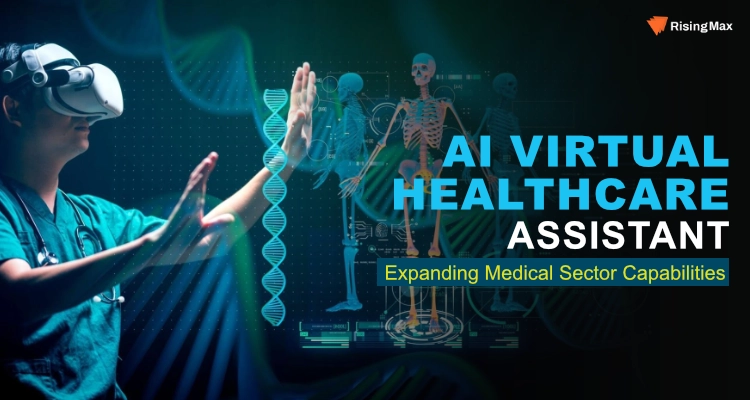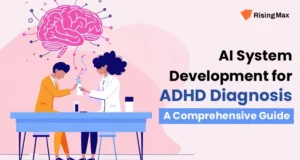Artificial intelligence is a revolutionary technology transforming how businesses manage and perform their day-to-day operations. The healthcare sector is adopting and automating various processes with AI-powered healthcare solutions. And AI virtual healthcare assistant software is one such revolutionary solution for the healthcare sector.
Healthcare facilities and hospitals are implementing AI healthcare assistants to bridge the communication gap. Powered with advanced AI and NLP algorithms, these virtual assistants analyze patients’ input and provide accurate human-like responses.
The ability of these virtual healthcare assistants to handle various internal healthcare processes makes it a revolutionary technology for the healthcare sector.

If you are planning to develop an AI virtual healthcare assistant or medical software solution, then connect with our experts at RisingMax Inc. We leverage our healthcare domain expertise to design advanced solutions for medical facilities and hospitals worldwide. Connect with our experts and discuss your requirements today.
Before delving deep into the topic, let’s start with the basics first.
What is an AI Virtual Healthcare Assistant?
AI virtual healthcare assistant is a software specifically built for healthcare facilities and hospitals that assists patients in multiple ways. These virtual assistants can identify patients’ healthcare issues, schedule appointments, send pill reminders, manage payments, and other healthcare services.
Medical facilities and hospitals are employing AI-powered virtual medical assistants as their first engagement to connect with patients and address healthcare issues.
Investing in AI-powered virtual healthcare assistants empowers healthcare organizations to provide remote medical consultation, streamline healthcare processes, and widen medical services’ reach.
Virtual Healthcare Assistant Market Statistics
- The Healthcare Virtual Assistants Market is projected to grow at a CAGR of 34.8% from 2023-2030 and generate a total revenue of USD 10.44 billion. (GLOBE NEWSWIRE)
- Virtual assistants like AI chatbots, smart speakers, text-to-speech assistants, and remote healthcare consultant software are expected to grow by $2.1 billion by 2031. (Allied Market Research)
- More than 45% of U.S. Adults trust AI virtual assistants in healthcare. (Hitconsultant)
The above statistics show the growing demand for AI virtual assistants in the healthcare industry. As a leading custom healthcare service provider, we assist businesses in implementing advanced software solutions and becoming more tech-friendly. Connect with our experts at RisingMax Inc. and start your digital transformation journey today.
Join hands with our healthcare software experts and build your own AI voice healthcare assistant to automate processes and streamline workflow..
Intriguing Features of Our AI Virtual Healthcare Assistant
Hospitals and healthcare businesses worldwide are integrating AI virtual healthcare assistants with mobile apps or web platforms to offer appointment scheduling, symptom checking, and medication alerts. These AI assistants are employed to reduce the burden on the front desk staff member, reduce administrative burdens, and enhance patient experience.
Here are some common features of a Virtual Healthcare Assistant
Symptom Diagnosis
This feature allows virtual healthcare assistants to analyze and diagnose symptoms based on the input provided by the patient. Further, based on diagnosis, the virtual assistant connects the patients with the concerned doctor/physician.
Book Appointment
With this feature, the virtual healthcare assistant allows patients to book, reschedule, or cancel an appointment with the healthcare providers. Further, the AI virtual healthcare assistant sends appointment reminders.
Pill Reminders
This feature allows healthcare facilities to offer personalized care to patients and send them pill reminders and other dosage-related information.
Health Records
Patients can get assistance to access their healthcare records, such as lab results, medical history, prescriptions, appointments, and more.
Remote Medical Services
The virtual healthcare assistant empowers patients to connect with doctors or physicians via video or telephone call. Patients from around the world can use this feature to securely and privately access healthcare services.
Emergency Assistance
This feature enables patients to gain emergency contact information and, in some cases, can connect users directly to emergency services.
Insurance Information
AI healthcare virtual assistant allows patients to gain information about insurance coverage, eligibility, claims, billings, and other information.
Language Support
AI healthcare virtual assistant offers multi-language support to accommodate users with different language preferences or requirements.
Health Tracking
This feature allows patients or doctors to track and monitor health signs, chronic conditions, or fitness progress through wearable device integration.
Fitness Guide
With this feature, virtual assistants can provide personalized diet plans and exercise routines and make necessary lifestyle changes. The software analyzes patients’ health conditions and previous health records to create fitness guides.
Recommendations
AI virtual healthcare assistant leverages next-gen technologies like AI to provide personalized health recommendations.
Payment Assistance
The patients can take assistance from these virtual assistants to understand insurance claims, medical bills, and payments.
Prescription Refills
This feature allows users to request prescription refills and provides information on medication availability and pick-up options. Thus making the entire refill process smooth and easy for patients.
Easy Integration
AI-based virtual healthcare assistants can easily integrate with next-gen devices and create an ecosystem with real-time health data tracking and patient monitoring.
Top 5 Use Cases of AI Virtual Healthcare Assistant
The healthcare industry is embracing and adapting next-gen technologies like AI-powered solutions to streamline processes and increase efficiency. Here are the top five use cases of AI virtual assistants in the healthcare industry.
Automate Appointment Schedule
Hospitals and healthcare facilities employ AI virtual assistants to reduce the workload on front desk staff employees and streamline appointment scheduling processes. The AI-powered virtual assistant engages with patients, understands their requirements, and books appointments based on the doctor/physician’s schedule.
Access Symptoms
The virtual assistants leverage integrated diagnosis tools to assist patients in finding healthcare issues based on symptoms. This is hugely beneficial for patients trying to understand healthcare issues. Patients can directly connect with the concerned doctor or physician, thus streamlining the overall process.
Answer FAQs
Employing an AI virtual assistant to handle common patient queries can greatly reduce the burden on front desk staff. These assistants can provide swift and accurate answers to patient’s healthcare queries 24/7.
Send Pill Reminder
AI virtual assistants are actively employed in the healthcare sector to send pill reminders to patients. Further, these next-gen software assist patients in medication refills and dosage reminders to offer various other healthcare services.
Collecting Data & Feedback
Healthcare facilities and hospitals worldwide employ AI-powered healthcare assistants to directly engage with patients and collect valuable feedback. These feedbacks are later carefully analyzed to take necessary actions to improve the quality of healthcare services and overall efficiency.
Why Are Healthcare Businesses Investing in AI Virtual Healthcare Assistants?
Hospitals and healthcare businesses worldwide are integrating AI virtual healthcare assistants within their processes to offer unmatched medical services and personalized patient care. These AI-powered assistants assist in understanding patient’s concerns and connect them with the concerned doctor or physician in a short time.
Here’s why the healthcare sector worldwide is investing in virtual assistants:
Offer Personalized Care
AI-based virtual healthcare assistants can engage with patients in dynamic and personalized conversations. These virtual assistants can be integrated with the EHR system to understand issues and assist patients in adhering to the prescribed medication and treatment plan. These virtual assistants can manage everything from medication reminders, follow-ups, reminders, and booking appointments, thus enhancing the healthcare journey.
Healthcare Monitoring
AI-powered virtual healthcare assistants can be integrated with healthcare devices such as wearables and sensors to monitor real-time health conditions. Any healthcare abnormality, disease symptoms, and potential concerns will be recorded and analyzed to assist doctors or physicians in making timely decisions.
Enhanced Disease Diagnosis
Healthcare virtual assistants monitor patients’ health conditions in real-time and create a healthcare database. This database can be analyzed later to find abnormalities and diagnose potential diseases based on health patterns. Early disease diagnosis assists in creating a personalized treatment plan for enhanced patient care.
24/7 Support
Unlike human healthcare service providers, AI voice assistants can effectively address patients’ queries 24/7. Everything from scheduling appointments, medication reminders, real-time healthcare monitoring, and offering personalized care, these AI-powered virtual assistants can handle tasks assigned effectively.
Remote Healthcare Services
AI voice healthcare assistants enable hospitals and healthcare businesses to offer remote medical services and widen their reach. These virtual healthcare assistants allow patients to share their healthcare concerns and directly connect with concerned doctors or physicians. AI healthcare assistants can remotely monitor patients’ health condition and raise an alert in case of any deviation or abnormality.
Promote Self Care
Patients and doctors can track health conditions and patterns with AI-powered virtual healthcare assistants. Real-time monitoring of health conditions assists patients in making necessary lifestyle changes and indulging in self-care.
AI Virtual Healthcare Assistant Development Cost
Similar to any healthcare software, there is no fixed cost associated with AI virtual healthcare assistants. However, if you plan to build a basic healthcare assistant for your healthcare business, the development cost varies between $40,000 to $45,000. Empowering the virtual assistant with Generative AI might increase the cost by $10,000 to $15,000.
Multiple cost-driving factors directly impact the overall AI powered virtual healthcare assistant cost. Having a clear idea about these factors gives you an overview of the cost of your new business venture.
Major cost-driving factors include the following;
- Virtual assistant type
- In-built features
- Project complexity
- AI virtual assistant capabilities
- Required tech stack
- Location of healthcare software development company
- Development team expertise
Get an AI Healthcare Virtual Assistant Customized Quote Today!
Our healthcare experts understand your workflow and virtual assistant implementation scope. With a clear project understanding and evaluation of prominent cost-driving factors, our team will share a customized development quote ASAP.
Why Choose Us?
Our software development team has been assisting clients in the healthcare domain for over a decade. We leverage our extensive domain knowledge and hands-on experience with cutting-edge technologies to build best-in-industry medical solutions.
Here’s why our clients trust us;
- Unmatched healthcare development services
- Proven AI software development experience
- Tailored healthcare solutions
- No hidden cost policy
- Ability to handle complex projects
- Flexible hiring models
- Affordable support and maintenance services
So, why wait?
Get in touch with our experts and share your AI virtual healthcare assistant project requirements today!















